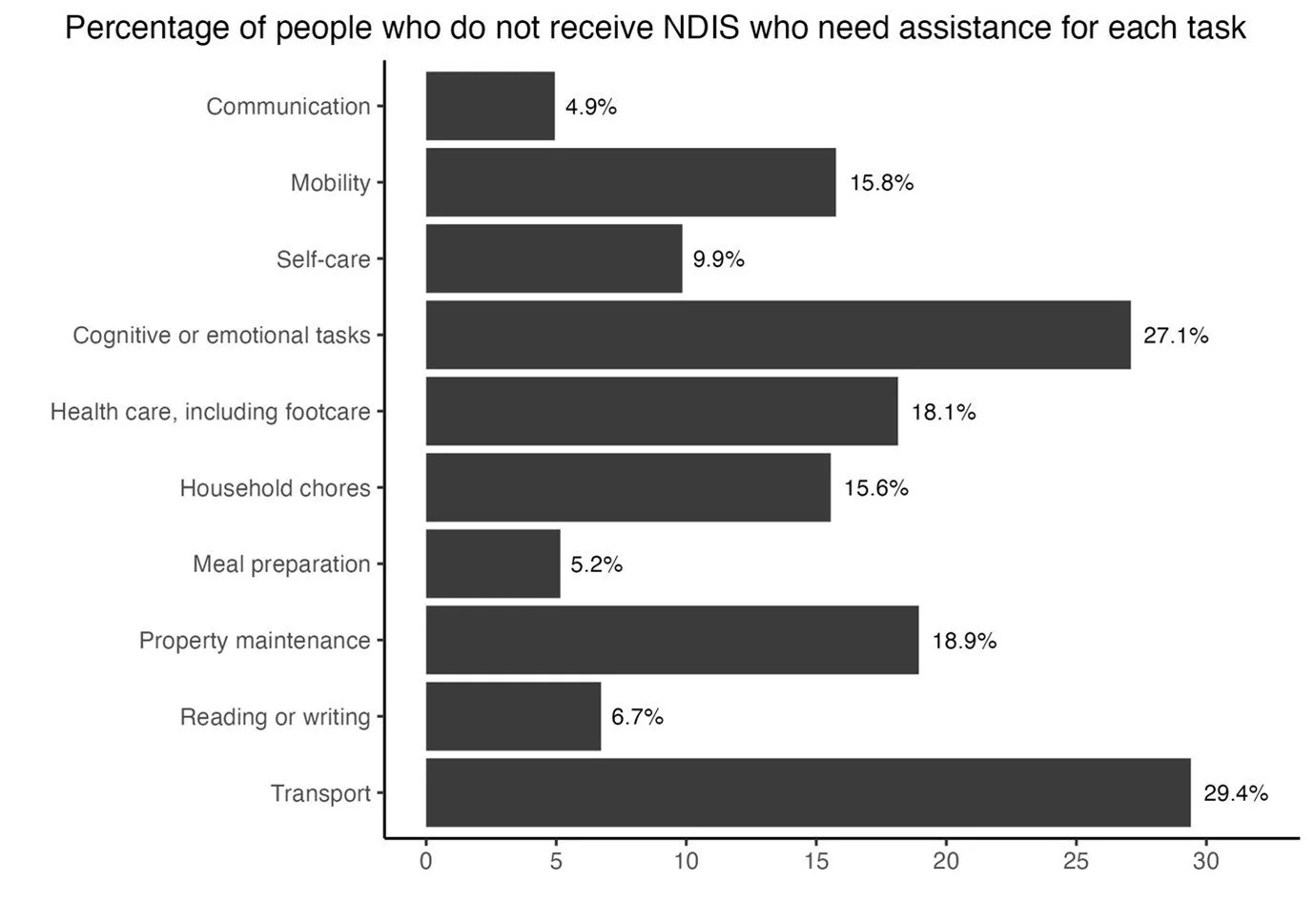No one left behind: the urgent need for disability support outside the NDIS
Reforms to Australia’s National Disability Insurance Scheme have tightened access to NDIS funding for people with disability before alternative supports are in place. Today, Glenda Bishop, Zoe Aitken, Anne Kavanagh and Sue Olney from the University of Melbourne highlight the urgent need for disability support outside the NDIS, particularly for those under the age of 65.
Asking for help when you need it – and getting that help – is something that everyone should be able to do. This is even more important if you have a disability and need help with basic everyday activities that other people take for granted. For people with disability, accessing support is not just a matter of convenience; it is a human right.
The National Disability Insurance Scheme (NDIS) was implemented by the Australian Government to meet the needs of people with severe and permanent disability aged under 65 years. Although the NDIS has made substantial difference to the lives of many people, the vast majority of Australians with disability do not qualify for the scheme.
Our latest research found that 1.9 million Australians with disability aged under 65 years do not receive NDIS funding and have to rely on other support systems.
Who misses out on NDIS support and what does that mean?
Unsurprisingly, people with disability who do not receive NDIS funding tended to have less severe and less complex disabilities. However, our research found that many people who do not receive NDIS funding still have support needs. The percentage of people outside the NDIS who needed assistance for different types of tasks are shown in the graph below. We estimated that 27.1% outside the NDIS needed assistance with cognitive and emotional support tasks, equating to about 500,000 people. When leaving the home, 29.4%, about 550,000 people, could not transport themselves to other places but needed another person to drive them. Our research also indicated that for tasks such as property maintenance, household chores, health care, or mobility, about 300,000 people outside the NDIS needed assistance with each of those tasks.
People with disability are more likely to be older, live in regional or remote areas, and experience greater socioeconomic disadvantage compared to people without disability. These factors compound the risk of falling through the cracks and failing to get the support they need, especially if they are ineligible for or unable to access the NDIS.
Mainstream services must step up
The Australian Government has committed to strengthening mainstream services such as education, housing, and transport and introducing foundational supports – disability supports outside the NDIS that provide general supports such as information and advice, as well as targeted supports for tasks such as shopping and cleaning. This is part of a broader effort to make the disability support system more inclusive, equitable, and sustainable, particularly for people who are not eligible for the NDIS. However, even though the foundational supports are supposed to be available by July of this year, there is a lack of clarity on what the supports will look like and when they will be introduced.
As Australia shifts toward a more inclusive disability support system that relies not only on the NDIS but also on mainstream and foundational supports, the data sends a clear message. The needs of people with disability not in the NDIS are substantial and likely to grow. Without major investment in support services that meet the needs of Australians with disability, we risk further entrenching inequality and placing unsustainable pressure on families, informal caregivers, and the NDIS itself.
Disability supports must span a wide range of everyday activities, including personal care, household management, transport, emotional support, and access to affordable aids and equipment. These are not optional extras – they are essential for dignity, independence, and inclusion, and are a basic human right.
Policymakers need to act now
The consequences of inaction will be significant for people with disability and their families. Previous research has shown that people with disability who are not NDIS participants rely heavily on family and friends to provide unpaid supports in the absence of viable and affordable alternatives. This can lead to worsening health and functioning for people with disability and ultimately drive up demand for the NDIS. This is an important issue given current efforts by the government to limit scheme growth.
Crucially, Australia has an obligation under the United Nations Convention on the Rights of Persons with Disabilities to ensure access to adequate supports for all people with disability, not just NDIS participants. That means no one should be left behind because of where they live, how their disability is defined, or whether they can afford to pay for an eligibility assessment.
A whole of government response is needed
Our research is a powerful reminder that while the NDIS is a vital part of Australia’s disability policy landscape, it cannot stand alone. The majority of people with disability – many with substantial support needs – do not receive NDIS funding. Meeting their needs requires coordinated, well-funded, cross-sectoral action. It also requires that foundational supports are implemented across all levels of government, requiring a collaborative approach between federal, state and territory governments.
Although people in the NDIS receive supports at no cost, there are likely to be out of pocket expenses for purchasing supports outside the NDIS, which is a considerable problem because many disabled folk are economically disadvantaged. Having a disability is expensive and the costs associated with disability substantially decrease the standard of living for people with disability and their families. Coupled with marginalisation in education and work, this continues to fuel financial inequality between people with and without disability in Australia, with consequences to health and wellbeing of people with disability and their families.
If the government is serious about inclusion, dignity, and rights for all Australians with disability, the policy response must extend far beyond the boundaries of the NDIS.
Content moderator: Cadhla O’Sullivan


